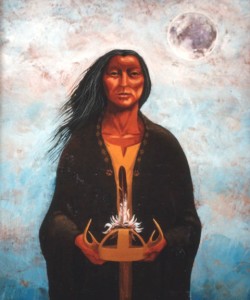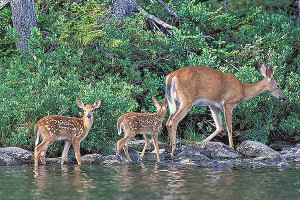older women
Older Women Take the Lead
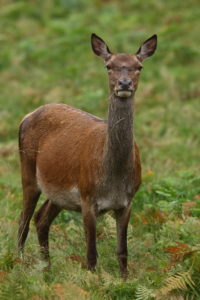 One of my favorite anti-ageism stories comes from anthropologist Margaret Mead who described the key role played by the “old does” of the red tailed deer herds in Alaska in ensuring the herd’s survival. The old does take the lead in perilous times for the herds. We are now seeing growing numbers of women, including many older women, take the lead as our own human species survival is so critically at risk.
One of my favorite anti-ageism stories comes from anthropologist Margaret Mead who described the key role played by the “old does” of the red tailed deer herds in Alaska in ensuring the herd’s survival. The old does take the lead in perilous times for the herds. We are now seeing growing numbers of women, including many older women, take the lead as our own human species survival is so critically at risk.
Below are two quotes from authors who heard Margaret tell her story many years ago. It is more relevant than ever in today’s times.
 First, from Joan Erikson, in her book Wisdom and the Senses:
First, from Joan Erikson, in her book Wisdom and the Senses:
“In the fifties when we worked in Stockbridge, we attended a lecture presented by Margaret Mead to a small audience of psychiatrists and guests. Her topic was the role of postmenopausal red-tailed deer which, she said, had been observed in the far north. In their old age, when all the old bucks had been killed off in contentious fighting over priorities and in territorial skirmishes, the females became the oldest survivors.
In time of drought, these old does could remember where once long ago under similar circumstances water sources had been found. When spring came late, they recalled sunny slopes where the snows melted early. They knew how to find sheltered places where blizzards could be waited out.
Under such circumstances, they took over the leadership of the herd. Old age, she postulated, has a unique contribution to make when well-stored, long experience and practical knowledge, fortitude, and hope are required. Women throughout time have practiced and nurtured these skills for community living and they serve ongoing species survival.”
And from Robert L Weber and Orsborn, The Spirituality of Age: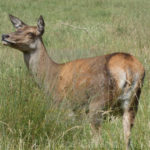
“What is the value of aging, to ourselves and to society? Let’s begin with a story about the value of aging to society. In the 1950’s anthropologist Margaret Mead delivered a memorable lecture that has relevance to our consideration. Her discussion centered on the role of postmenopausal red-tailed deer in their herd.
From the outside these old does appeared to have no value. Their male counterparts, charged with protection of the herd, had all been killed off over the years. It would be natural to think of the elderly who remained as burdens to the herd. But this was not the case.
Mead goes on: ‘In time of drought, these old does could remember where once, long ago, under similar circumstances, water sources had been found. When spring came late, they recalled sunny slopes where the snows melted early. They knew how to find shelter, places where blizzards could be waited out. Under such circumstances, they took over the leadership of the herd.’
Margaret’s story goes straight to the heart of the question at hand, standing in stark contrast to contemporary society: a culture that still tends to think of aging as a problem, marginalizing, ignoring, and even reviling the elderly. But just as the old does knew where to find sunlight, we who are growing old have knowledge and wisdom to share with others, inner reserves of resources upon which to call that are often dismissed too readily by those who would benefit the most.”
Ageism in Modern America
While cruising Facebook this morning I came across an article posted by Paula Span, an author I respect so much for her insightful blog posts when she was featured as the writer for The New Old Age for the NY Times. Out of a budget cut, her weekly blog was cut but she still writes for the Times sometime and posts on her FB page. Here is the link to the article she posted which was written by the chief of geriatrics at Columbia University: America’s Bias Against Older Women Must Stop
The article has to do with the flurry of ageist comments in the media lately having to do with Caitlin Jenner. Not comments so much that were disparaging about her transformation from Bruce to Caitlin but comments that were denigrating of older women. Demeaning comments, snide jokes, general put-down’s about older bodies, in particular older female bodies.
This topic and more importantly this phenomenon is so widespread and so ubiquitous in our culture that it is overwhelming when considered. And that overwhelm can easily lead to increased poor self esteem on the part of older women, denial and fighting against “aging” thus the billions spent on anti-aging products, and depression. I see this depression so very commonly in my counseling work with older women, espeically those in their 60’s and 70’s.
There is a common thread of complaints under the heading of ageism whether we use that word or not. The experience is of: being the butt of disparaging and cruel jokes, feeling devalued, ridiculed, infantalized and invisible. of not counting, that they don’t matter.
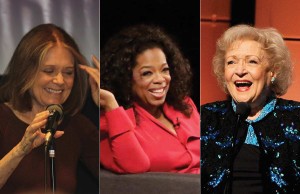 I wonder about our fear of women and women’s power in this culture. We women do have some kind of power when we are young and beautiful. Perhaps that is instinct that we are attractive when we can procreate. Perhaps we are also considered more valuable then because we “consume” therefore Wall St and the media value us. That doesn’t make much sense tho’ when you consider that older women and older people in general are big consumers and oh by the way voters as well.
I wonder about our fear of women and women’s power in this culture. We women do have some kind of power when we are young and beautiful. Perhaps that is instinct that we are attractive when we can procreate. Perhaps we are also considered more valuable then because we “consume” therefore Wall St and the media value us. That doesn’t make much sense tho’ when you consider that older women and older people in general are big consumers and oh by the way voters as well.
No, there is something intrinsic and deeply rooted in why this culture devalues older women to such an extent. More than they do older men although there is devaluing there too. Is it related to fear of mortality and fear of dying? Is it the fear of becoming superfluous and needy? We know that our culture puts huge emphasis on independence and me-ness. Cross interdependence is not a big part of our cultural tone. And/or does ageism towards older women have to do with latent resentment towards primary attachment figures who predominantly are mothers emerging later when our mothers or ourselves are now in a vulnerable position. Payback time in other words?
I believe that we lose out as a culture and a people when we do not value our older women and listen to what they have to teach us. Margaret Mead told a story about the old does of the red tail deer herds in Alaska. In times of drought or severe storms, it was the old does who had the memory of out of the way watering holes or sheltering cliff where they could find refuge from the storms. The herd rallied behind and old does towards safety.
I worry about this way we have of devaluing and demeaning our older women. We are in times of crisis. We need all the wisdom we can find. Denigrating and oppressing and discounting an entire segment of our population is anti-survival and anti-wisdom. I hope we can change. I hope that we boomers can push back against too-often-accept stereotyping and dismissing of older women. Our survival may just depend on it.
